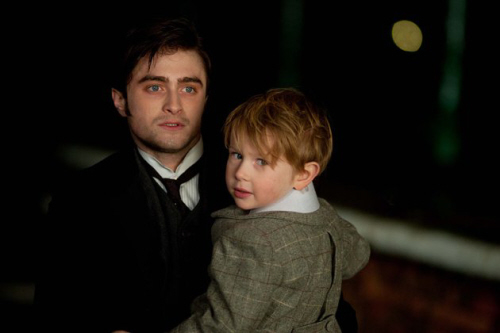
The Woman in Black is a touching tale of the extremes some mothers will go to get revenge for the perceived mistreatment of their children. Or, more aptly, it is a cautionary tale on the poetic potency of promising never, ever to forgive anyone for anything. It begins, like most of these things begin, with a death. Actually, if you want to get all technical about it, it begins with the taking of imaginary toast and tea.
Figure Two: The Three Fisher Girls do their best impersonation of Ginny Weasley, as possessed by Tom Riddle

The opening sequence would have been so much scarier for me if the three barely pubescent teenaged girls next to me didn't provide this not-so-subtle running commentary:
Thing One: Why is there no tea coming out of the teapot?
Thing Two: Oh MY GOD! Why are they stepping on the doll's head!?!
Thing Three: SSSHHHHHH! HAHAAHAHAHAHAHAHA.
Thing One: That poor DOLL!
Thing Two: I don't get why they stepped on her head!
Thing Three: HAHAHAHAHAAHAHAHAHAHA.
It went on like that until my sister went to fetch an usher to properly shush the crap out of them.
By then, I'd missed the basic "set-up" of the tale, but, thanks to the girls next to me, managed to figure out that Harry Potter was, in fact, the star of the movie. I'm pretty sure, if they were asked to describe the plot of the movie they paid good money to see, the girls next to us would say something like this:
Harry Potter's wife dies and he gets, like, really sad but is happy when a baby crow delivers him a letter to go to Hogwarts (see Figure Three below).

Upon arriving to Hogmeade, Harry is mistreated by the suspicious townfolk who think he is a Muggle Warlord, and, like the Baby Jesus, tell him there is simply no room in the inn for his kind. He stays anyways, because, he's like, so totally badass.
Harry goes to Hogwarts, where he learns all kinds of cool spells! And tries to find this creepy old unnamed lady who is, like, totally killing all the little kids in Hogmeade. She really needs a butterbeer!
Figure Four: Expelliarmus, Woman in Black!

So, anyways, Harry isn't really observant, and he keeps "seeing" the Woman in Black, and kids keep dying, but his friend Hagrid and Professor Trelawney invite him over for dinner and help him avoid the townspeople. During dinner, Professor Trelawney totally has this vision and starts drawing pictures into the dining room table with the butter knife. She's, like, so not a good artist.
Figure Five: Harry and Professor Trelawney discuss the likelihood of this movie not having a happy ending.
Finally, Harry decides that in order for You Know Who to not kill his still living son, he'd better reunite the Dark Lord-ette with her "lost" child. He and Hagrid go into the moors at midnight, armed with a car and some very sturdy rope. Then, Harry's all like "Accio, muddy corpse!" and he and Hagrid reunite the Dark Lord-ette with her baby. They think they've totally crushed the last Horcrux...Of course, She Who Shall Not Be Named has other plans. The movie ends with Harry Potter and his son waiting at King's Cross Station on Platform 9 3/4 for the Hogwart's Express. To Heaven.

Sigh.
Sadly, they're not that far off.
This film's got plenty of scares - and WAY too many creepy antique toys. And I was with it for 99% of its journey (if you count, hiding behind my sophisticated grey sweater as "with it"). The end, well, the end is terrible. It was as if someone told the filmmakers that a "happy ending" was essential, that death cannot simply be a terrifying place where ladies in black and the much-maligned youth of whatever-town-they-lived-in all run free and torment the living. If you shave off the film's final three minutes, well, then it's a jolly good show ol' chap and I'm so very glad to have seen it during the daylight hours.
Now, rot in hell, xoxo, forever and ever and ever,
The Woman in Grey and Blue




